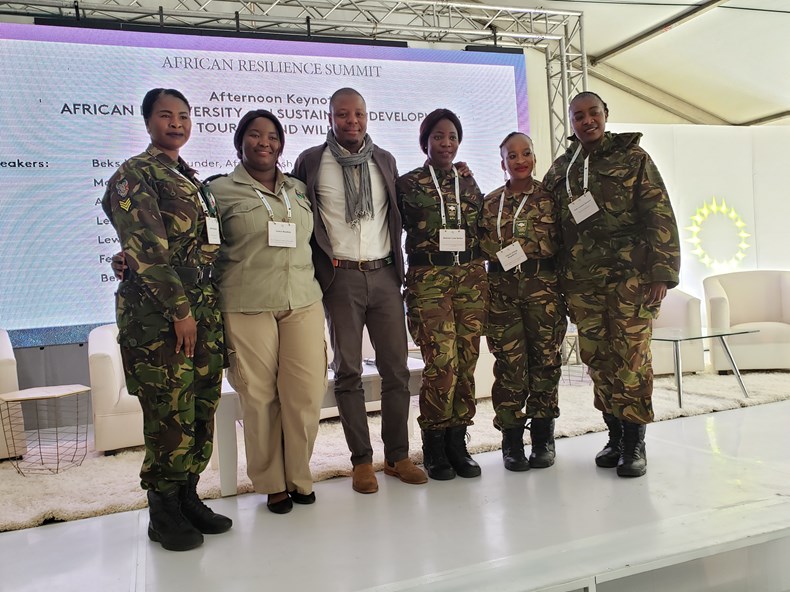African Bush Camps founder and CEO, Beks Ndlovu addresses Global Travel and Tourism Resilience Council on “resilience.”

Image: Beks Ndlovu joined on stage by the Black Mambas who talked on their goals to protect African wildlife.
The Global Travel and Tourism Resilience Council was held at Constitution Hill, Johannesburg on Wednesday 24th July. The conference invited delegates from across our African borders and the globe to voice and share information and industry knowledge. The day consisted of a variety of panel discussions based on developing resilience in African tourism to enable us on the African continent to better equip, prepare and empower ourselves to ensure we can sustain and meet projected tourism growth despite foreseen and unforeseen crisis.
Beks Ndlovu, professional guide and founder of African Bush Camps, addressed delegates on how building resilience can radically change the future of tourism on the African continent. In his address, he identified the need to transform the African narrative. Beks identified three key components to do this, empower local communities through robust training and education, understanding our environment by identifying our surrounding pressures and situations. Thirdly by leveraging collaboration with both industry partners, suppliers and governments.
Speaking from his personal experience having founded, Somalisa Camp based in Hwange National Park, Zimbabwe in 2006, at the height of political and economic downfall. Beks projected his resilience to succeed despite the unfavourable situation. Subsequently, African Bush Camps opened its 15th Camp in May this year. None of this would have been achieved if these three key factors were not the driving force.
African Bush Camps through the African Bush Camps Foundation was nominated for the educational program implemented at Mambanje School on the border of Hwange National Park. In collaboration with the community and teachers, African Bush Camps Foundation improved access to the school, installed safe drinking water and drastically improved the staff accommodation and school facilities. The upgrades created an environment where both teachers and scholars can flourish and has seen the school being elevated to the top 5 in the region.
In closing, Beks echoed the voices of his peers that it's time for Africans to tell our story, identifying the need to, "develop a future that isn't rocked by adversity but rather one that is swollen with opportunity. So that our grandchildren can experience the beauty of Africa in the same way we are able to do so today."
